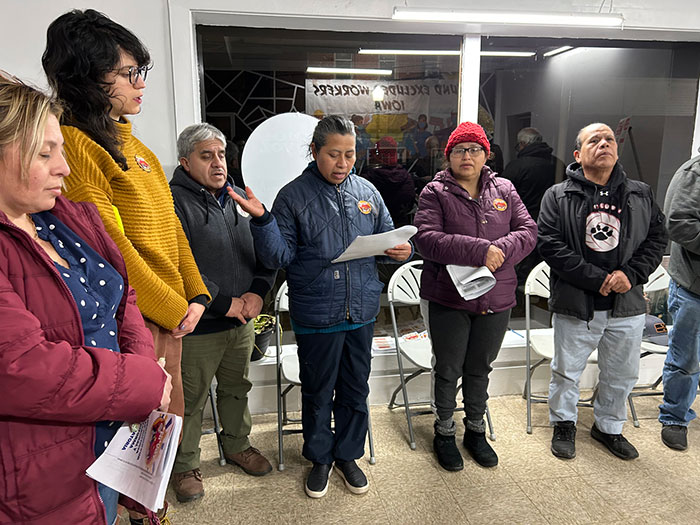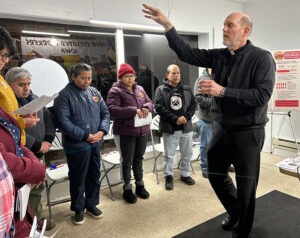
Meatpacking plant workers and advocates of workers pray during a meeting with Bishop Thomas Zinkula on Feb. 27 in Columbus Junction at which they shared their objections to proposed changes in Iowa’s child labor law.
By Barb Arland-Fye
The Catholic Messenger
COLUMBUS JUNCTION — Bishop Thomas Zinkula met with 15-20 meatpacking plant workers Feb. 27 in a barebones office building to listen to their objections to proposed changes in Iowa’s

child labor law.
The legislation, which committees in the Iowa House and Senate passed, would allow minors ages 14 to 17 to work in jobs currently off limits, such as factories, as part of a training program through their school or employer. The bill also would expand work hours for teens and allow 16- and 17-year-olds to serve alcohol (Iowa Capital Dispatch, March 3).
On March 6, the bill’s supporters added an amendment to Senate File 167 that would not permit the directors of the departments of Labor and Education to extend waivers for students to work in mining, explosives, radiation, logging or slaughtering/meatpacking. However, the bill remains a work in progress, said Tom Chapman, executive director of the Iowa Catholic Conference.
The faith-based advocacy group Escucha Mi Voz (“Hear my voice”) hosted the Feb. 27 meeting during which Claire Lewandowski, an Escucha Mi Voz organizer, translated workers’ testimonies for Bishop Zinkula. Their concerns focused on jobs in meatpacking plants that are dangerous and unsuitable for minors, the propensity for job-related injuries, harsh working conditions, a perceived threat to job security, discrimination/favoritism and the detrimental impact on the education of minors.
One meatpacking plant worker said the plant he works at has some simple jobs but also some very dangerous jobs. He said workers are “poorly taught” in their jobs. He worries that kids would

Bishop Thomas Zinkula blesses meatpacking plant workers and advocates of workers on Feb. 27 in Columbus Junction. The workers shared their objections to proposed changes in Iowa’s child labor law.
face even greater risk of injury because of their young age. He also claimed plant supervisors show preferential treatment and discrimination. “None of us wants our kids to be in that situation.” Bishop Zinkula asked for an example of discrimination. The worker said employees from different countries are treated differently.
The worker’s wife, also employed at a meatpacking plant, said the plant claims that safety is number one but does not demonstrate it. She expressed concern about the likelihood of injury and that employers would not be liable for youth workers injured on the job. (Legislators later deleted that provision following negative national publicity.) She also raised concerns about the possibility of youths driving vehicles in the plant, particularly heavy machinery, at night. She predicted, “There will be lots of accidents…. I think we have to raise our voices and say, ‘It stops here.’”
Another meatpacking plant employee said she had to take time off from work because of swelling in her hands that caused significant pain. She thinks supervisors would use youth workers as a tool to threaten adult workers’ job security. Other workers expressed similar concerns.











